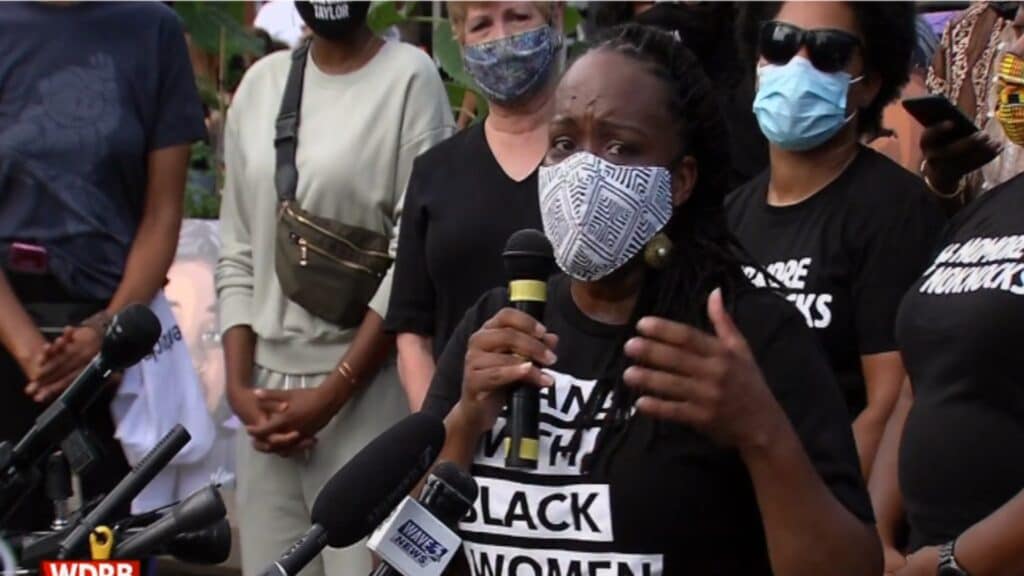Officer charged in Breonna Taylor case pleads not guilty
Loading the player…
LOUISVILLE, Ky. (AP) — The lone Kentucky detective facing charges related to the fatal shooting of Breonna Taylor pleaded not guilty Monday.
Brett Hankison’s plea comes five days after a grand jury indicted him on three counts of wanton endangerment for firing into the home of Taylor’s neighbors. If convicted, he could face up to five years in prison on each count.
Read More: AG Cameron’s claim that Breonna Taylor’s boyfriend shot cop unsupported by ballistics
Hankison’s lawyer asked that his client be allowed to keep firearms for self-defense, saying Hankison, who was fired in June, “has received a number of threats.” The judge turned down the request.
The grand jury declined to charge Hankison or the other two undercover narcotics officers who opened fire inside Taylor’s house with her shooting. The decision not to charge the officers set off protests in Louisville and across the country.
On Monday, Louisville’s mayor lifted the curfew put in place after people refused to end their nighttime protests. Mayor Greg Fischer’s statement said the 9 p.m. curfew had served its purpose.
“We sadly saw some violence, including the shooting of two police officers, one of whom remains hospitalized, dealing with complications of his injuries. But we believe the curfew helped, by ensuring fewer people were out late in the day,” Fischer said.
Kentucky Gov. Andy Beshear said the protests were largely peaceful, with a few people taking advantage of the situation to commit violence.
“Let me say this, 99.99% of people that took to the streets or the sidewalks did so peacefully, raised their voices to be heard and we should listen. We should listen to the trauma and to the pain,” Beshear said.
Meanwhile, Kentucky state Rep. Lisa Willner, a Louisville Democrat, said Monday that she’s starting to craft legislation that would narrow the scope of the state’s rioting statute.
Her proposal, which she intends to offer in next year’s legislative session, would protect people from being charged with first-degree rioting if they’re present but don’t engage in destructive or violent actions. Her response comes after Democratic state Rep. Attica Scott was charged with the felony last week while participating in Louisville protests for racial justice.
“This is not any attempt at all to weaken the current law,” Willner said in a phone interview. “It’s just to make sure that people who are peacefully protesting, who are merely exercising their First Amendment rights, are clearly not engaging in rioting.”
Scott was among demonstrators who converged in downtown Louisville to express their disagreement with the grand jury decision. Many marched along Louisville’s streets chanting “Breonna Taylor, say her name,” and “no justice, no peace.”
Taylor was shot multiple times after her boyfriend opened fire as officers entered her home during a narcotics raid on the night of March 13, authorities said. Taylor’s boyfriend said he didn’t know who was coming in and fired in self-defense. One officer was wounded.

A coroner’s report obtained Monday says Taylor was shot five times and died of multiple gunshot wounds. It says she was hit in the torso, her upper left extremity and both lower extremities. She tested negative for drugs and alcohol.
Scott, the state’s only Black woman representative, was arrested and charged Thursday night with the felony of first-degree rioting as well as unlawful assembly and failure to disperse, which are misdemeanor offenses.
Police said Scott was in a group whose members damaged buildings and set fire to a library.
Scott called the charges “ludicrous” and said she would never be involved in setting fire to a library. She said she was arrested as she walked with her daughter to the sanctuary of a church.
Kentucky law defines a riot as a public disturbance involving five or more people “which by tumultuous and violent conduct creates grave danger of damage or injury to property or persons or substantially obstructs law enforcement or other government function.”
The law defines first-degree rioting as knowingly participating in a riot that causes injury to a person who is not rioting or causes substantial property damage.
Scott said she and her daughter were driving from a protest to a church that offered refuge to people who would otherwise be caught violating the curfew when police blocked their route, so they parked and walked to the church instead. Officers then converged on them to make arrests before the curfew took effect, Scott said.
“LMPD swarmed us,” Scott said. “They started yelling, ‘Circle ‘em, circle ‘em.’ They wouldn’t let us leave to go back to our vehicle. And they wouldn’t let us literally cross the street to get to the church and sanctuary.”
Willner said Scott’s arrest “raises the question of how many others have been accused of rioting in the first degree — which is a felony — who are facing loss of voting rights, simply by being present.”
“We can make the language much clearer so that in order for a person to be convicted for riot in the first degree, it should be clear that they participated in the unlawful action by engaging in violent or destructive acts or by complicitly encouraging others to engage in violent or destructive acts,” she said.
Republicans have overwhelming majorities in both chambers of the Kentucky legislature.
___
Hudspeth Blackburn is a corps member for the Associated Press/Report for America Statehouse News Initiative. Report for America is a nonprofit national service program that places journalists in local newsrooms to report on undercovered issues.
Have you subscribed to theGrio’s new podcast “Dear Culture”? Download our newest episodes now!
Loading the player…
Published at Mon, 28 Sep 2020 22:30:43 +0000
